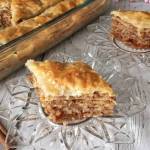Baklava
Baklava is a classic Greek syrupy dessert made with layers of crispy phyllo and lots of nuts!
Equipment
- Baking pan
- Mini food chopper, optional, but handy to crush the nuts
- Small sauce pot
Ingredients
- 1 ¼ cup (200 grams) crushed almonds
- 3 cups (420 grams) crushed walnuts
- 1/4 cup (35 grams) plain breadcrumbs
- 1 teaspoon ground cinnamon
- 1/2 teaspoon salt
- 1/2 cup (125 mL) unsalted butter, melted
- 1 pound phyllo dough
- 1/2 cup (125 mL) unsalted butter, melted (for brushing onto the phyllo dough)
For the syrup:
- 1 ¼ cup (250 grams) granulated sugar
- 1 ¼ cup (310 mL) water
- 3/4 cup (180 mL) honey
- 1 teaspoon freshly squeezed lemon juice
- 1 slice lemon
- 1 cinnamon stick
Instructions
Prepare your syrup:
- Bring to a boil the sugar, water, honey, lemon juice, lemon slice and cinnamon stick. Lower heat and cook just until sugar melts, stirring occasionally. Remove from heat and allow to cool completely.
For baklava:
- Preheat oven to 350 degrees Fahrenheit (177 degrees celsius).
- Combine in a large bowl the almonds, walnuts, breadcrumbs, ground cinnamon, salt and melted butter. Stir well to combine. Set aside.
- Butter the bottom of a 9 x 13 inch rectangular glass baking pan. Place 2 sheets of phyllo on the bottom of pan. Your sheets of phyllo will be too large to line the bottom of the pan perfectly. This is good. Leave one end of the phyllo sheets hanging over the long end of your pan. Using a pastry brush or your fingers, brush on some melted butter. When brushing the butter on the phyllo sheet do so lightly. The goal is not to saturate the phyllo with butter. Then, add 2 more phyllo sheets, this time letting the phyllo overlap on the opposite end of your pan. Brush on more melted butter.
- Repeat with 2 more phyllo sheets, overlapping this time on the original side. So, to summarize, your bottom layer of baklava will be 6 sheets of phyllo, with butter being applied between every second sheet, and with phyllo hanging over the two long sides of your pan
- Onto this bottom layer of phyllo, evenly spread 1 ½ cup of the nut mixture. Top this with 4 layers of phyllo, brushing on butter after every second phyllo sheet. Again, remember to allow the excess phyllo to hang over alternate ends of your pan.
- Evenly spread 1 ½ cups of the nut mixture. On top of this add 4 layers of phyllo, as above. Add another 1 ½ cups of the nut mixture, and then top with another 5 layers of phyllo. Spread the remaining nut mixture (it will be less than 1 ½ cups). Top your baklava with 6 to 8 layers of phyllo dough, using some of your overhanging phyllo sheets. Simply bring them over, two at a time, to cover the baklava. You will need to cut off carefully (and discard) some of the excess phyllo dough. Lightly butter the top layer of phyllo.
- Using a sharp knife, carefully score the baklava making 3 cuts lengthwise, and then creating a type of herringbone pattern alongside these cuts. This is not an exact science and in fact, the only thing you really need to know is that the vents you will create by scoring the phyllo will help it to bake properly. They will also be your guides when it comes to cutting out serving pieces.
- After you have scored your phyllo dough, sprinkle it with about a tablespoon of water using your fingertips, this will prevent the pastry from curling. Place in the middle rack of an oven set at 350 degrees Farenheit (177 degrees Celsius). Bake for approximately 30-40 minutes, or until top is golden brown.
- Remove from oven, and while your baklava is still hot, pour on the cooled syrup. Pour the syrup evenly over all parts of the baklava.
- Allow to sit at least a couple of hours before cutting and serving.
- Baklava can be kept at room temperature for several days. Do not cover it tightly with plastic wrap, as this will cause your phyllo to get soggy. Instead, when it has cooled completely, use a clean tea towel or piece of cheesecloth to cover your baklava. This will keep it fresh and crispy.
- Enjoy!
